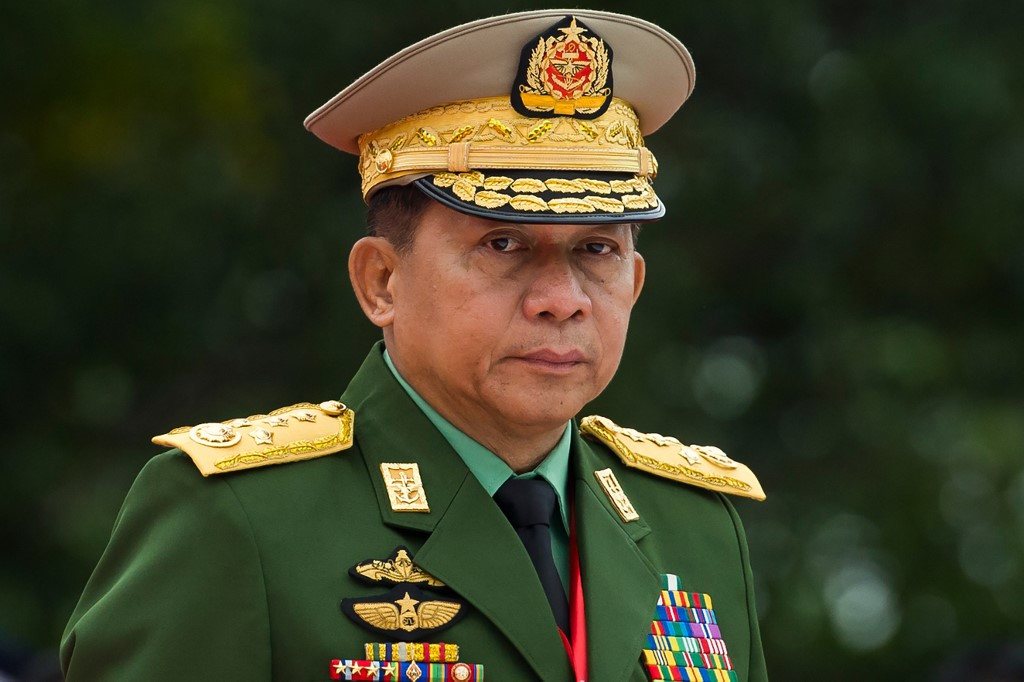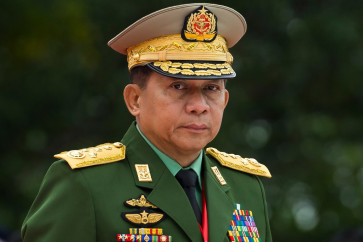Popular Reads
Top Results
Can't find what you're looking for?
View all search resultsPopular Reads
Top Results
Can't find what you're looking for?
View all search resultsMaking sense of ASEAN’s decision on Myanmar: A legal point of view
The AMM is providing room for Myanmar to restore its internal affairs and return to normalcy at the first instance.
Change text size
Gift Premium Articles
to Anyone
 In this file photo taken on July 19, 2018, Myanmar's Chief Senior General Min Aung Hlaing, commander-in-chief of the Myanmar armed forces, arrives to pay his respects to Myanmar independence hero General Aung San and eight others assassinated in 1947, during a ceremony to mark the 71st anniversary of Martyrs' Day in Yangon. Myanmar's military seized power in a bloodless coup on February 1, 2021, detaining democratically elected leader Aung San Suu Kyi as it imposed a one-year state of emergency. (Agence France-Presse/Ye Aung Thu)
In this file photo taken on July 19, 2018, Myanmar's Chief Senior General Min Aung Hlaing, commander-in-chief of the Myanmar armed forces, arrives to pay his respects to Myanmar independence hero General Aung San and eight others assassinated in 1947, during a ceremony to mark the 71st anniversary of Martyrs' Day in Yangon. Myanmar's military seized power in a bloodless coup on February 1, 2021, detaining democratically elected leader Aung San Suu Kyi as it imposed a one-year state of emergency. (Agence France-Presse/Ye Aung Thu)
O
n Oct. 15, the ASEAN Foreign Ministers (AMM) met virtually to discuss preparations for the 38th and 39th ASEAN Summit and Related Summits.
The AMM made two profound pronouncements. First, that “no consensus was reached for a political representative from Myanmar to attend the 38th and 39th ASEAN Summits and Related Summits in October 2021”. Second, the AMM instead decided “to invite a nonpolitical representative from Myanmar to the upcoming Summits, while noting the reservations from the Myanmar representative”.
These two-pronged decisions beg myriad questions rather than providing straightforward clarity. For instance, Evan A. Laksmana, a political scientist, immediately asked through Twitter whether as a result of the AMM’s rulings the coming summit could be called a summit at all when one member is not politically represented. Additionally, he also pondered who could be deemed a nonpolitical representative but equal to ASEAN leaders?
These concerns are legitimate. To push the envelope further, does the AMM have any Charter-based competence to make such decisions? Can the AMM prohibit the participation of a member head of state or government in a summit, arguably the supreme policy-making organ of ASEAN?
An inquiry into the ASEAN chair’s statement would suggest that it seems neither the Tatmadaw (Myanmar military) nor any of its opposing parties expect to be invited to the coming summits. At the very least, the chair’s statement is silent on whether they are both barred from attending the summits. There is no express stipulation to that effect nor to the contrary. But this interpretation is corroborated by at least two premises.
First, the fact that the AMM is reaffirming the principle of noninterference before alluding to its current decision signifies that it does not want to publicly lecture Myanmar on its domestic issues. Rather, the AMM is providing room for Myanmar to restore its internal affairs and return to normalcy at the first instance. It says that it is not up to the organization to resolve the heart of Myanmar’s issue. Rather, the resolution to such an impasse is contingent upon Myanmar’s home-produced solution and national ownership.
Second, Walter Moon indicated in his commentary on the ASEAN Charter that the noninterference principle does not bar the AMM from raising a matter of common concern in its meetings, either discreetly or openly. In fact, Article 2, paragraph 2, sub-paragraph (g) of the ASEAN Charter requires member states to enhance their consultation on matters seriously affecting the common interest of ASEAN. That may virtually include any domestic issues that have cross border implications or anything that may jeopardize ASEAN’s relations with its partners. Hence, such a duty, added Moon, could only imply that deeper and broader cooperation is necessary among members and this is precisely what ASEAN did through its five-point consensus then, and now by inviting a nonpolitical representative.

















